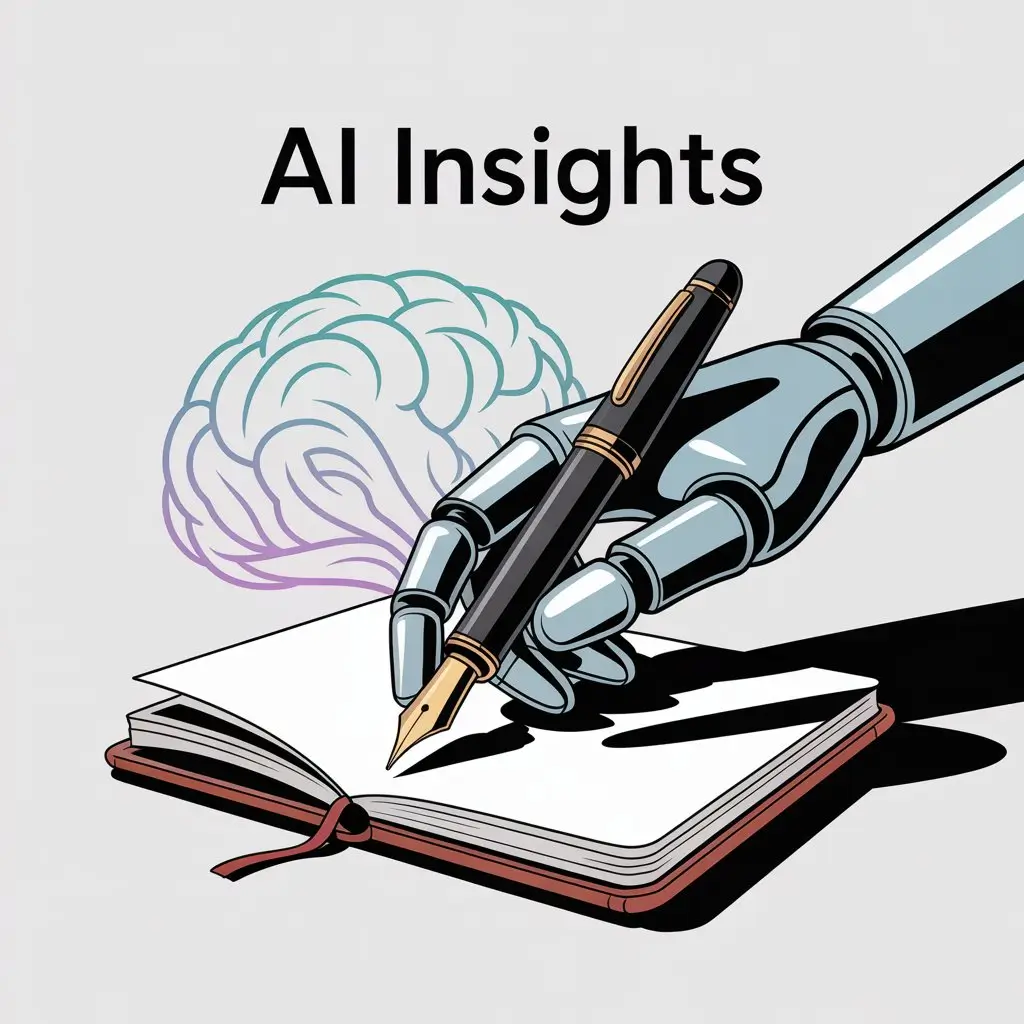Keeping a journal is a tried and tested, albeit effective, method of comprehending ourselves, dealing with emotions, and going after personal goals. Writing thoughts down is effective for many people, as it helps them unclog their minds and remember how they have progressed over certain periods. However, it can be a challenging and overwhelming experience to adhere to a journaling routine or not know what to write. Artificial intelligence (AI) can make a practical difference here. With sensitive questions and personal guidance, AI can help transform journaling into a more focused experience. In this article, we will examine what AI can do to help you draft a self-improvement journal capable of helping you track your growth and increase your self-awareness more than conventional Journaling could.
The History of Journaling as Self-Improvement
Traditional Journaling is more than just a fad.
Journaling is an ancient practice that helps us identify our thoughts and feelings. Handwriting allows us to take time and concentrate, which may enhance our memory and understanding of our lives. Most individuals discover that writing their emotions on paper calms them and makes them feel psychologically clearer, making it easier to deal with daily demands and overwhelming emotions.
Most people show journaling as a one-way conversation we have with ourselves, unlike when talking to others; journalists can write freely and speak their opinions without interruption and fear of judgment. It is a healthy place that allows us to tame painful emotions and consider our lives in our own time. With time, one may refer to previous journal notes to find patterns and learnings that can be used as personal development guides and support better decision-making15.
Studies have found that Journaling is helpful for emotional well-being. It decreases anxiety rates, increases self-consciousness, and elevates mood. It can even result in reduced sick days and healthy living in general. Although it occasionally arouses unpleasant emotions, the long-term effect of Journaling makes it an effective method of self-improvement and therapeutic healing246.
To conclude, traditional journalism is still an excellent way to connect with ourselves, our inner reality, and how we travel towards a better life.
Making AI a game changer in Journaling
Though basic Journaling is very useful, there are some pitfalls, such as sticking to it, which might be hard, or deciding what to write. That is where artificial intelligence (AI) will come as a useful friend. With the emergence of AI, new opportunities are in place to provide personalized guidance, which makes Journaling easier, more engaging, and more effective.
When using AI, you are no longer subjected to the blank page and are unsure where to begin. Smart apps based on AI can provide considerate prompts depending on the current mood, objectives, or previous entries, making you revel in your thoughts in greater depth. After some time, AI begins learning about your writing habits and can tell you things that may be difficult to find yourself.
AI can make journaling more than a person writes; it is a tool that helps people review the past and grow. It will make you want to stick to the routine, monitor your evolution, and become more self-conscious. By so doing, AI is transforming how we journal and making it a more effective exercise to enhance our existence.

The Direction AI Can Give Your Journaling Experience
The first step
A golden rule in using smart prompts encourages a person to engage in further self-discovery.
A major aid that AI can bring to your journaling habit is to provide intelligent prompts that capitalize on your personal experiences and objectives. Artificial intelligence will not leave you with nothing to say; instead, it prompts you to think of ideas and asks intelligent questions to help you feel more intensively about your emotions, issues, and success. These prompts vary according to your mood, what you have previously written, or particular areas in which you wish to improve, so your journaling experience is more valuable.
For example, when you feel anxious, AI may encourage you to investigate the cause of stress or propose some relaxation methods to practice. If you are developing yourself, it may pose questions that can make you set the objective or point out your advancements. This individualized solution can assist you in discovering things that you would have overlooked when using generic Journaling, and it can make your writing an effective, potent method of self-discovery and emotional understanding123.
Responsive Education and Customized Knowledge
AI will not simply provide blank prompts; it will start learning based on what you write and progressively get better at knowing what you write, think, and feel as time passes. This neural learning enables the AI to deliver personalized information as you continue keeping a journal. This information becomes more precise and useful as you continue journaling. Analyzing your writing, AI can reveal some patterns, emotional triggers, or habits you are unaware of.
For example, AI can notice that some situations frequently make you stressed and will point them out and recommend how to deal with them. It can also sum up your progress, demonstrating how your mood or state of mind has benefited for weeks or months. Such individualized feedback will help you better understand your mental and emotional status so your Journaling becomes more about self-development and self-improvement rather than a collection of thoughts.
Monitoring and developing Consistency
One of the greatest setbacks in Journaling is consistency and actual progress experienced after some time. AI can assist you by reminding you to write periodically, and it should not be an issue to check your progress. Rather than journaling being an activity you can get out of your way, AI makes it a regular practice in which you transition to improvement.
The AI tools will pleasantly remind you so that you can write and have a habit of writing every day or every week. They also note your entries, pointing at the worst or the best moments of your life or your evolutional mood and attitude. Not only is it easy to see how you have grown, but it also pinpoints the areas of growth, the difficulties you have encountered, and what trends you are developing as a person.
With AI, Journaling becomes an everyday habit that provides definite feedback and motivates you. Such regular support may turn journaling into a long-term solution to self-development and emotional wellness.
Essential Details about AI-Based Journaling Apps
Guided Thoughts and Timely Reflections
Among them, AI journaling apps can distinguish from the systems of personal prompts that make writing simpler and more significant. Rather than staring at an empty page, the users are met with inquisitive, individual questions, which make them focus more on their emotional development, goals, and everyday life adventures. These prompts evolve with time depending on what you are writing, and this aids in discovering new things and remaining glad about journaling135.
Guided journaling programs Many apps also offer structured journaling programs or journaling programs over several days that help with specific improvement goals: CYookiebyaplus GuidedJournalingApp Such a direction will contribute to the regularity of such experienced and novice journalers and enter the zone of learning more about personal growth and development35.
These prompt systems generally convert journaling as an exercise of record-keeping into a more interactive and insightful activity that helps with emotional clarity and self-awareness125.
item Analysis and Pattern Recognition
The other strong aspect of AI journaling apps is the possibility of examining your mood and detecting a pattern in your writing. Enjoying happiness, stress, or feeling sad means showing emotions in how you use words and tone, which AI can identify as time passes. This will make you more conscious of your emotional swings even when they are not realized in your day-to-day activities.
AI also recognizes common themes or stimuli in your journal entries. To give an example, it may be observed that there are specific situations or thoughts when anxiety or frustration may appear regularly. Pointing at these patterns, AI makes you more aware of how you feel and makes you willing to work on underlying problems.
This habit of mood monitoring and pattern detection makes the journal useful for monitoring your mental state and personal development. It also contains information about a healthier lifestyle and a balanced emotional life.
Greater Accessibility and User Friendliness
AI journaling app helps simplify journaling for all people and makes the process enjoyable. Most have an easy-to-use interface that you can use easily to begin writing without formal technical complications. These apps usually have various modes of inputting your thoughts, which can be typed out, or they can use voice dictation or even attach photos or other media to enhance your entries.
Such features as tagging, bookmarking, and Search options enable you to sort your journal and readily revisit it, commonly helping you trace your progress or locate a particular reflection. Also, many apps offer the possibility of setting personalized reminders to make journaling a habit so you can develop one quickly.
The user experience also entails privacy and security. Popular AI journaling applications have high-security settings and provide such services as PIN codes or biometric locks, which help save your thoughts. With this ease, flexibility, and safety, we will feel safe and comfortable with self-reflection, and you will feel engaged and motivated during your journaling life167.

The Advantages of Journaling with AI
Working with Journaling Disadvantages
Journaling is not easy for people since one may need to know what to write about, be motivated, or maintain a habit. AI-assisted Journaling can remove these barriers due to its simplification and enhanced interest in the process. For example, you can express your ideas using AI, as it can capture your thoughts textually or in voice; hence, you need not worry about the start or structure of the thoughts or how to structure them13.
AI can also give you personal prompts and other recommendations based on your previous entries and mood so that you can overcome writer’s block and your thoughts can return to your mood26. This advice makes journaling new and contemporary; most people are encouraged to write continuously. Also, AI tools remind you to keep pleasant notes gently and monitor your progress so you can develop a consistent practice of journal keeping without being overwhelmed13.
AI journaling helps eliminate cognitive overload and minimize the time people need to spend on self-reflection. It lets people sort out their thoughts automatically and gain valuable insights that can be further transformed into actionable hacks15. This care transforms the journaling practice into an achievable one that would make you a better and more effective person who can better control your emotions.
Enhancement of Self-knowledge and Emotion Clarification
AI-assisted Journaling is more like simple writing; it helps you get to know yourself better. By analyzing your entries, AI can reveal patterns in your thoughts and feelings that you are unaware of. It may reveal secret feelings, stressful issues, or delightful situations that set you in a mood.
With the help of AI, you get space to think about the harder emotions and look more candidly at what you have experienced. This advanced self-knowledge might make you aware of your own more emotional or sentimental range and help you understand what or who is significant to you and who or what may be holding you in bondage. The procedure facilitates shadow work, where the difficult sides of your personality are exposed in a well-regulated manner.
Finally, AI makes your journal a mirror in which you see your inner world best to make balanced decisions and develop yourself better regarding mental health.
Promoting a Coherent Development of Self
The AI-enabled diary also motivates you to begin your writing process and ensures you make a significant step in your journals. With AI-based prompts, Journaling can become an everyday routine: many users can keep a habit by seeing new messages regularly and having the opportunity to write down the specific experience. This follows through directly to actual improvements in your mental health and development, termed personal growth.
Emotional awareness, stress management, and general well-being also experience a great boost after regular Journaling with the help of AI, as shown in the studies and the user’s experience. To illustrate, the Rosebud and Resonance apps provide real-time support and target recommendations that assist the user in identifying patterns, coping with anxiety, and growing resilient. Users claim they are less stressed, more concentrated, and can handle situations reserved by facing them regularly using AI instructions.
With support for constant reflection and providing specific feedback, AI journaling tools will serve as a personal coach to keep you motivated and involved in your self-improvement process. The continual habit eventually delves deeper, bringing healthier habits and greater emotional stability.
Conclusion
AI is changing journalism’s face to simplify, more individualized, and revelatory. It removes the most frequent obstacles, such as writer’s block, and makes journaling a tool of self-discovery as the user dives deep within their thoughts. To everyone interested in personal development, the experience of using AI-powered journaling applications can be beneficial in guiding and supporting the person. Not merely a device, AI becomes a partner in your quest for self-discovery and provides you with the chance of permanent emotional insight and development. ➤

